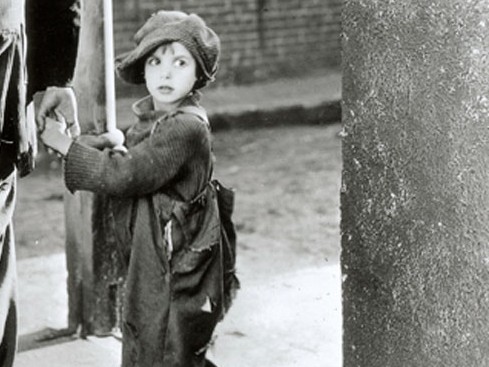If you watch a lot of movies, you know there are tropes we see on the screen over and over.
There are also things that happen over and over off-camera, and some of them are quite unpleasant, like the story of a child star who makes a fortune that somebody else ends up spending.
The literal poster child for that story was Jackie Coogan.
He was the first mega child star in the movies, spotted by Charlie Chaplin at age four and a household name not long afterward.
Coogan famously said that other kids would line up to see baseball’s megastar Babe Ruth, but Babe Ruth came to see him.
When it was time to learn to swim, his teacher was Olympic champion Duke Kahanamoku.
And his public appearances sometimes drew hundreds of thousands of fans.
Coogan was a millionaire before age 10, thanks to his many hit movies and his merchandising deals.
But like many other child stars, his career started to slow as he grew up.
Not to worry, as soon as he turned 21 he’d have access to his millions and then he could do whatever he wanted, right?
Right?
There’s an old story that a friend had stopped by the family’s house and warned Coogan’s mom never to teach him arithmetic, because then he’d want to know where his money had gone.
The money went to Coogan’s mother and stepfather, and they spent almost all of it.
When Coogan was about to turn 21 and access his fortune (the papers wrote articles ahead of this), the stepfather, who was a well-connected lawyer in the entertainment business, went public, telling the world that a dependent child’s earnings were the property of the parents and that he and his wife were perfectly entitled to all the money Coogan had earned.
Coogan’s own mother told the papers “no promises were ever made to give Jackie anything.”
Coogan took them to court, and during a deposition the mother testified that “Jackie was a bad boy, a very, very bad 20-year old boy.”
The star won the case, but of the estimated $4 million fortune, he ended up with about $125,000.
He went on to serve his country as a pilot in World War II, and eventually returned to acting, first on the stage and then on TV, most famously as Uncle Fester on the original Addams Family sitcom.
But his biggest impact came after he lost his fortune, when furious lawmakers in California quickly passed the Coogan Law.
It requires that the earnings of child performers go into a trust fund that they can access as adults.
Since this show isn’t about happy endings, though, I will point out that people have found ways around some of those rules to enrich themselves with money that belonged to their kids.
Before that one guy slapped that one other guy over what the one other guy said about the one guy’s wife, the undisputed champion of weirdness at an awards show was back in 1974, when a dude pulled off a streak during the Academy Awards.
His name was Robert Opel, and he’s got a whole fascinating backstory: he’s almost certainly the only guy to streak across a live TV broadcast and get roasted by co-host David Niven who had also previously worked as a speechwriter for Ronald Reagan.
Anyway, once he’d made the rounds of TV talk shows explaining his Oscars stunt, Opel reportedly said that being a streaker was too limiting, so he tried stand-up comedy.
He was onstage at a club in Philadelphia (clothed) when, of course, a streaker interrupted the show by walking across the stage.
JACKIE COOGAN, CHILD STAR OF FILMS, DIES AT 69 (New York Times)
From ‘angel’ to ‘monster’ (Los Angeles Times)
What Became of the Oscar Streaker? (New Yorker)
Give now to support our show on Patreon (we won’t let anybody else take the money)

